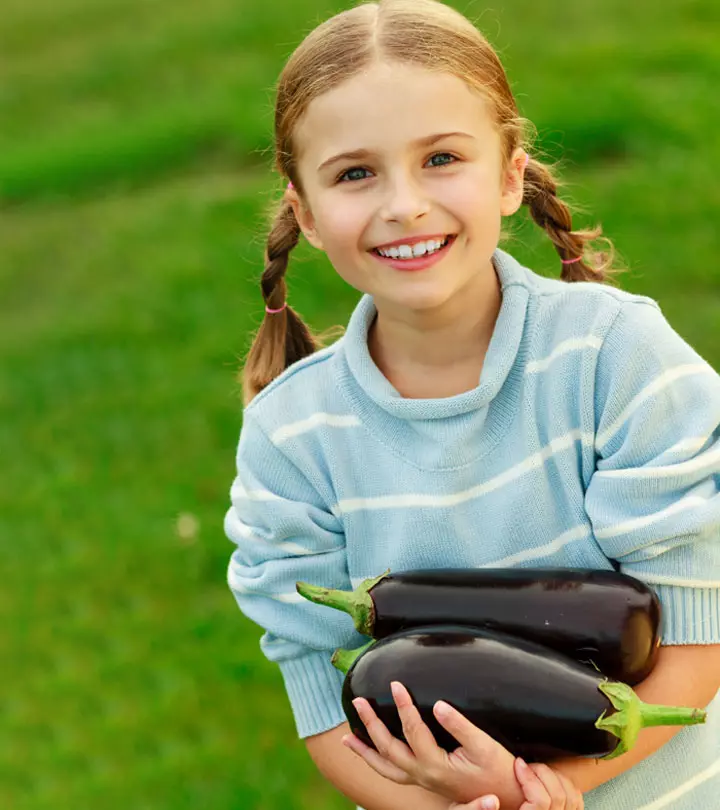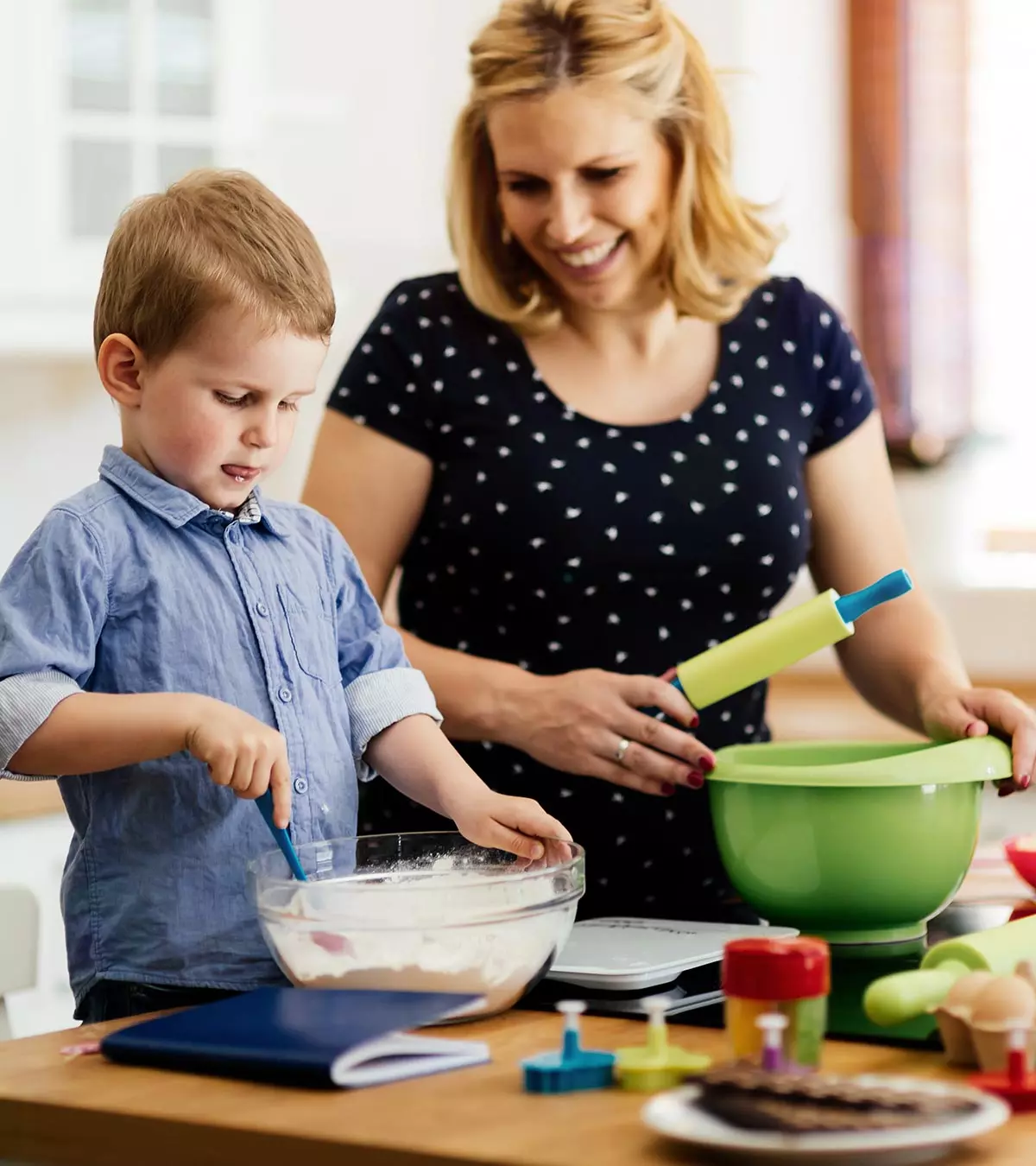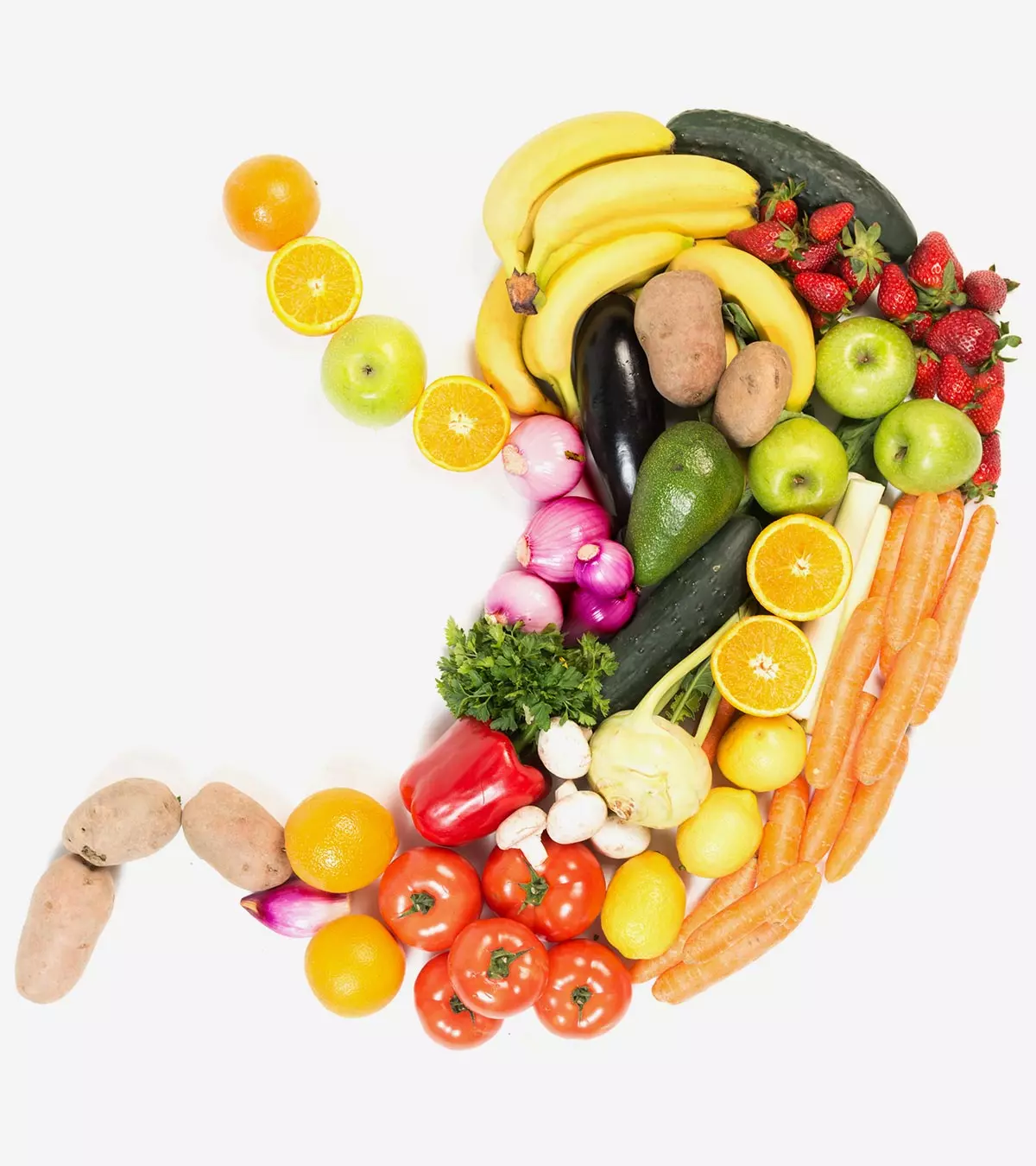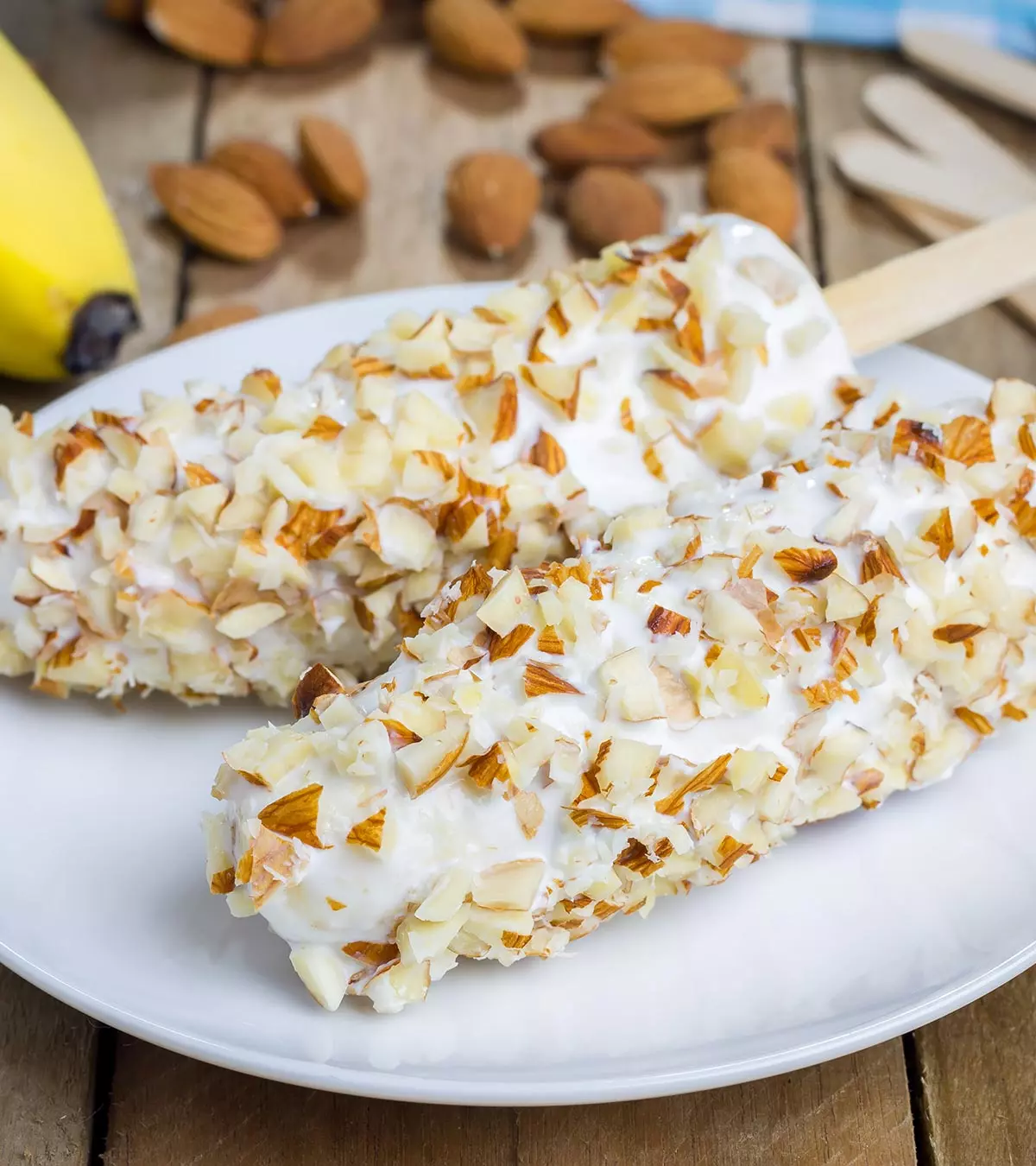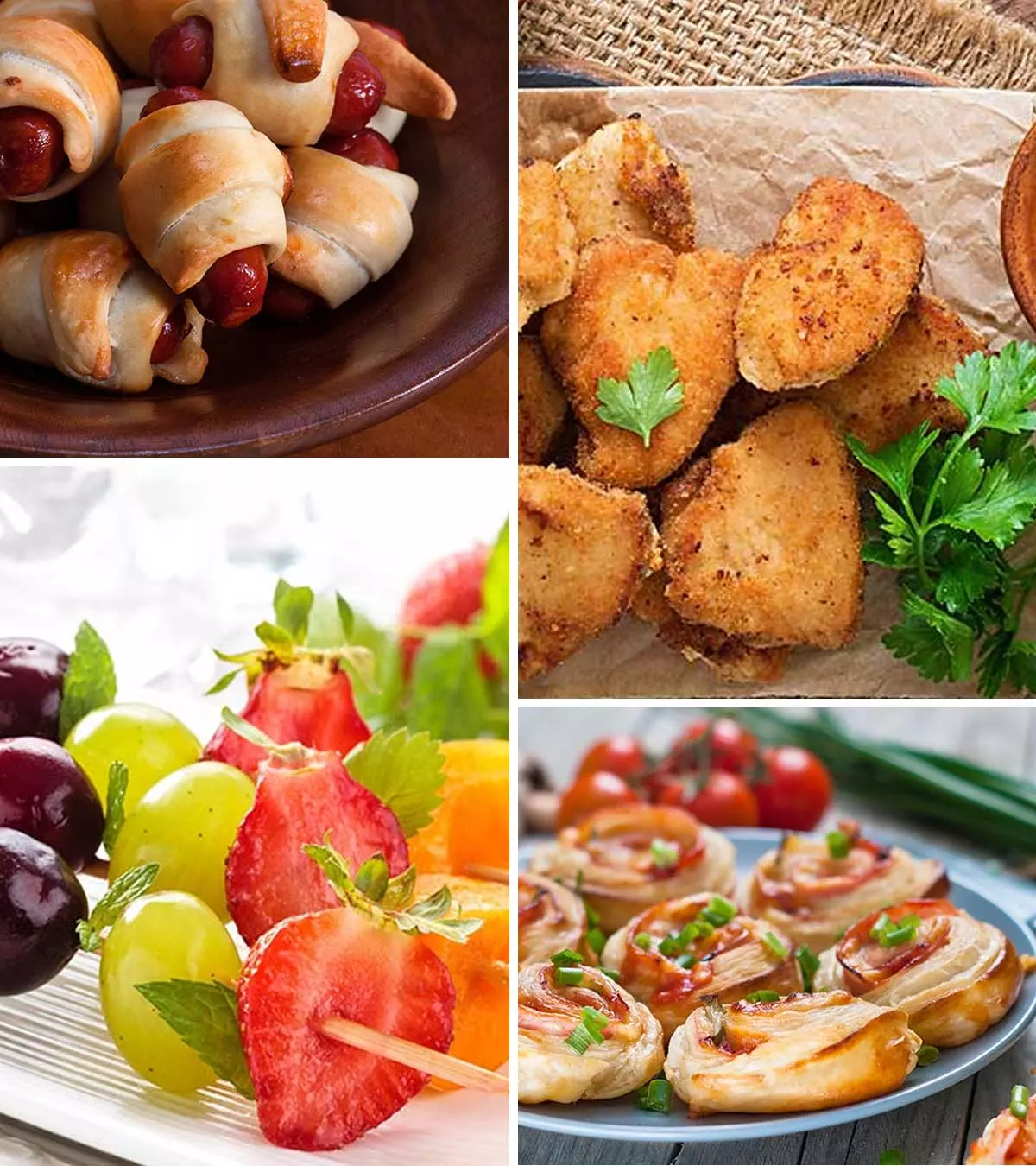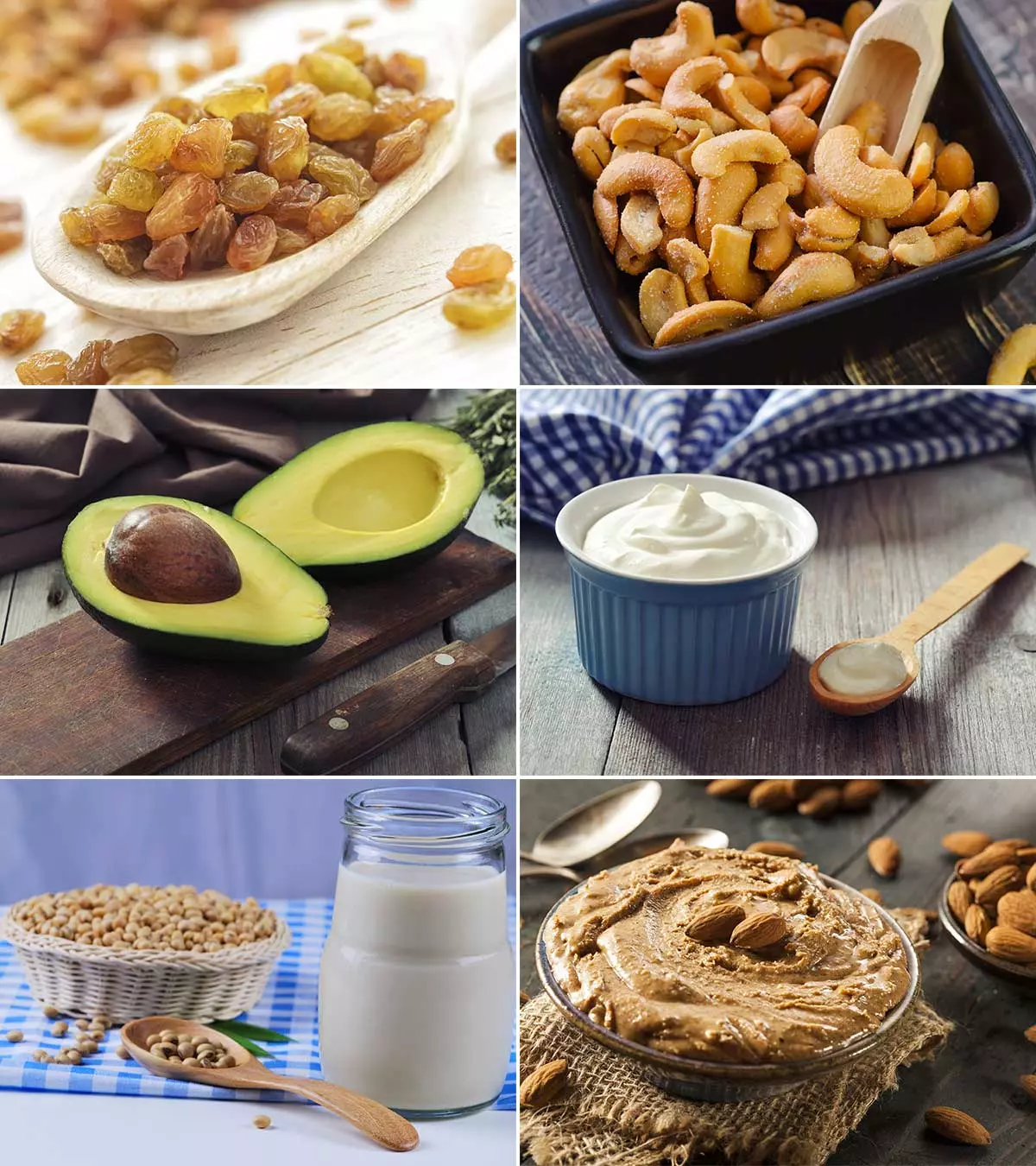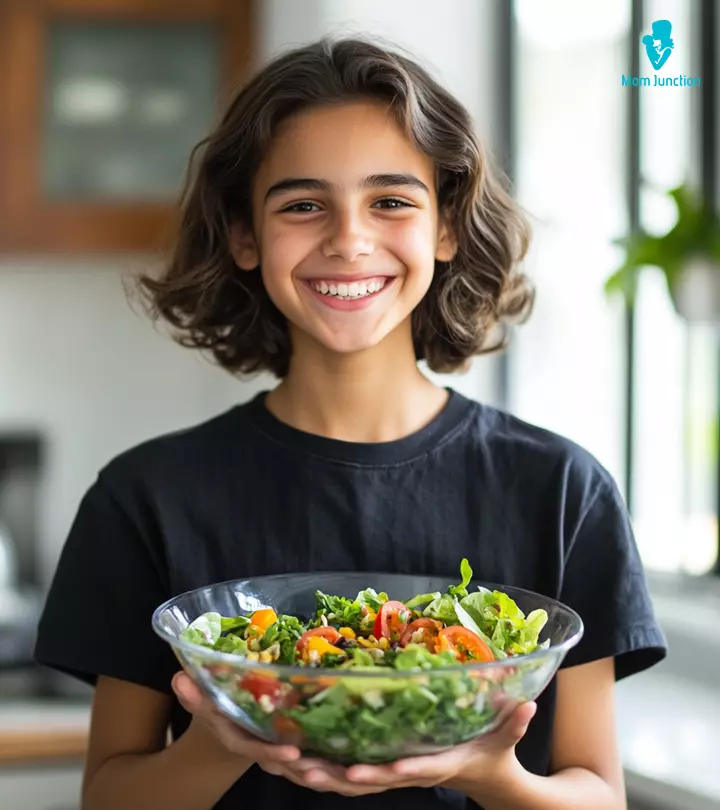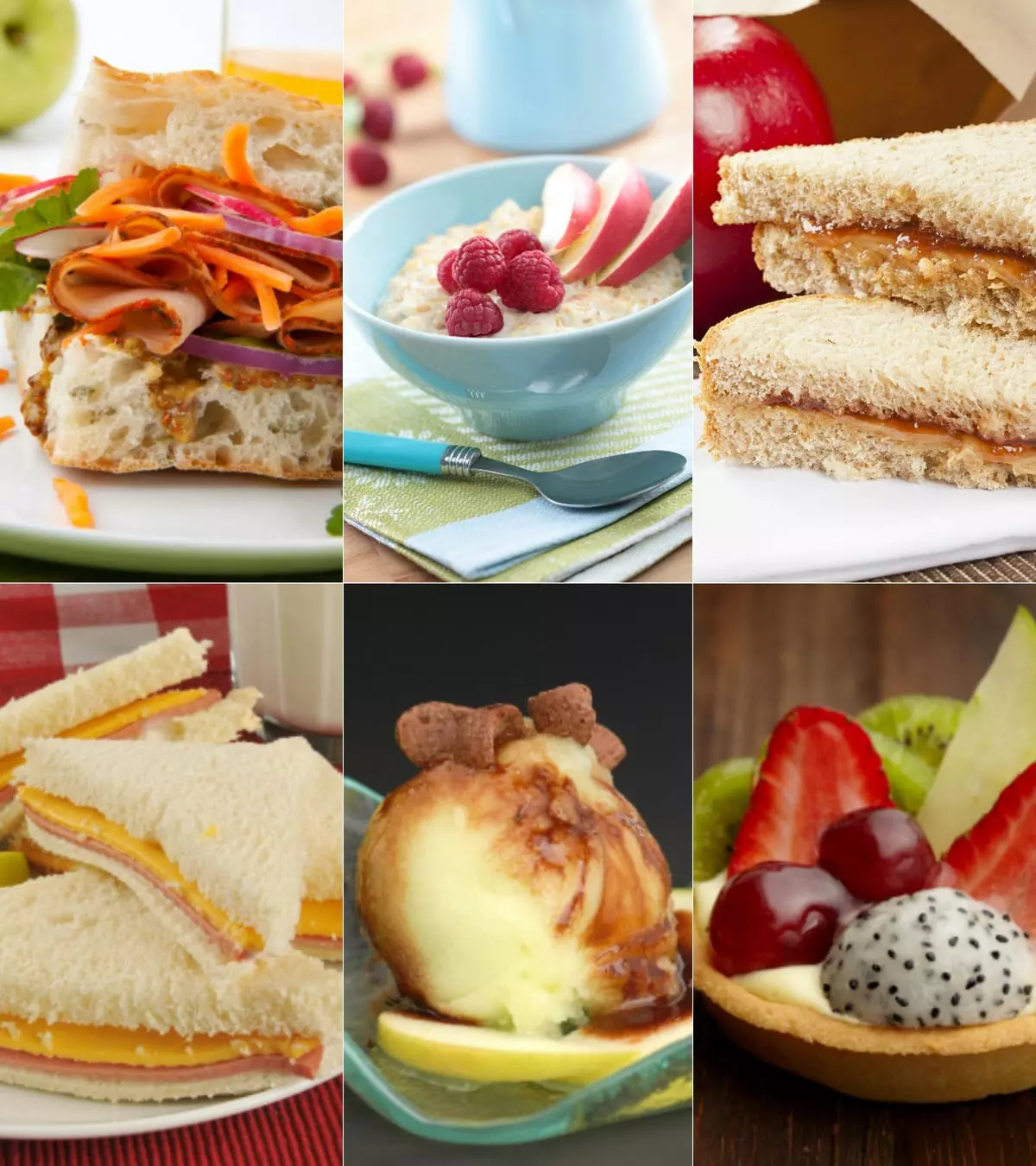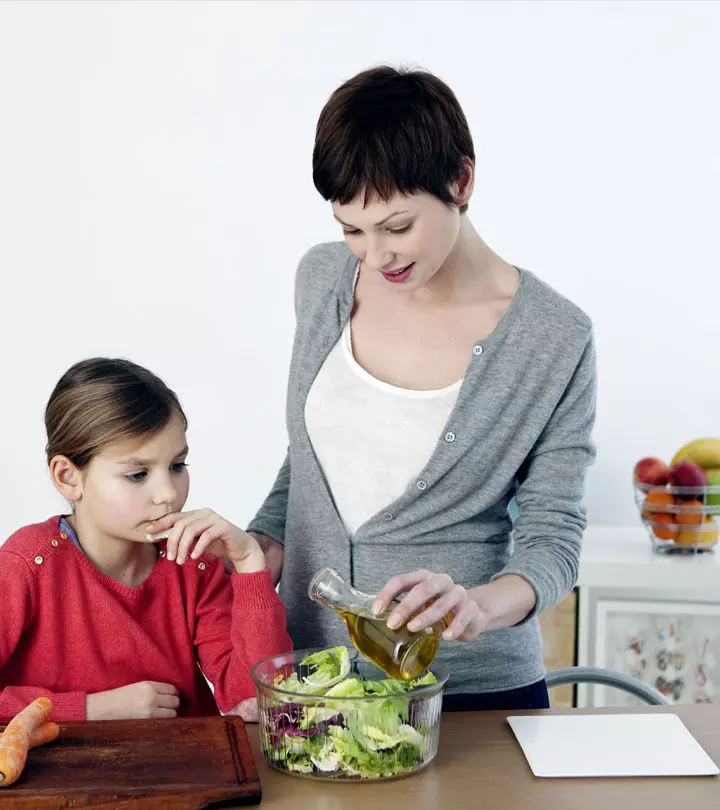
Image: ShutterStock
Using olive oil for kids’ food can be a healthy option for its numerous benefits. For example, olive oil helps promote brain function and growth, prevents cardiovascular diseases, and establishes quality skin care. However, you should know its quality and proper usage before adding olive oil to any preparations. There are different types of olive oil available, but not all are suitable for consumption. Therefore, if you are using olive oil in your child’s diet, ensure it is good quality. This post provides detailed information on the types of olive oil, its benefits, and its different uses.
Key Pointers
- Olive oil is commonly used in cooking, beauty, and pharmaceutical industries.
- Olive oil can help reduce symptoms of ADHD, prevent heart disease and cancer, promote brain development, and lower the risk of obesity in children.
- Virgin olive oil or extra virgin olive oil is produced without chemical treatment and is recommended for cooking.
- Olive oil contains vitamins A, B, D, and E and good calories that can keep a child’s eyes, skin, and hair healthy.
- Olive oil can be introduced into a child’s diet as soon as they start eating solid foods.
What Is Olive Oil?
Olive oil is obtained by processing whole olives. They are used worldwide for cooking, beauty care, pharmaceuticals, and even as fuel!
The oil ordinarily used in kitchens comes from Europe, most likely Spain. Spain controls almost 44% of the world’s olive oil production. Furthermore, it finds its prevalent usage in the Mediterranean diet and is mostly consumed raw or in cooking. This healthy oil come in different grades:
- Virgin: Virgin or extra virgin olive oil is produced without any chemical treatment. You can use this oil for cooking and as salad dressings.
- Lampante: This oil is not suitable for consumption. But if it is refined, it may be consumed.
- Olive pomace oil: This is the oil mostly used for cooking purposes. It is extracted from the olive pulp, using solvents and heat.
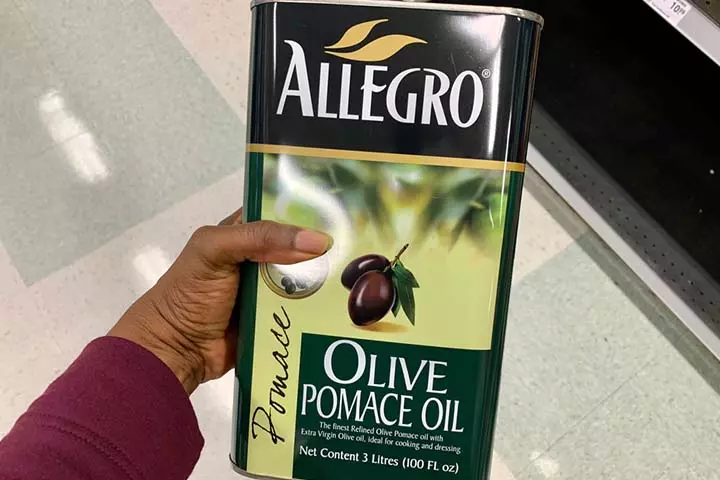
Now that you know what olive oil is, let’s find out the benefits it has to offer.
 Quick fact
Quick factBenefits Of Olive Oil For Kids
Your kid’s health is a priority for you. You can go to any lengths so that you can ensure the baby gets a balanced diet. But that isn’t easy, is it? So, the one thing you can do is start using olive oil. Here are some of the major reasons olive oil should be part of your little child’s diet:
1. Helps with ADHD symptoms

Attention Deficit Hyperactivity Disorder or ADHD, is becoming increasingly common today. A systematic review and meta-analysis by multiple institutions examined 53 cross-sectional research and found that 7.6% of 96,907 children aged three to 12 had ADHD. Its cause is unknown, but ADHD can make school a nightmare for your kid. Olive oil is known to help children deal with ADHD symptoms better (1).
2. Prevents cardiovascular diseases and cancer
Olive oil contains polyphenol, a natural antioxidant that is known to bring down triglyceride levels in the body and maintain cardiovascular health
. It also repairs damaged tissues to bring down the risk of cancer (2).
3. Promotes brain development

Filled with Omega acids, olive oil is a great way to promote your kid’s brain development, making it an excellent source of Omega-3 for kids.
4. Rich in vitamins
Kids need vitamins for their health and growth. Olive oil contains numerous vitamins, including vitamin A, which plays a crucial role in promoting vision health in children and adults, alike. Vitamin B helps in brain development while Vitamin D helps keep the bones healthy. Olive oil also contains vitamin E. Extra virgin olive oil and olive oil have several vitamins that help in reducing bodily inflammation and strengthening the immune system.
5. Keeps skin and hair healthy
Olive oil contains a number of antioxidants, including Squalene, which can help keep your kid’s hair and skin healthy (3).
6. High on calories
Olive oil is high on calories and can meet your kid’s daily calorie requirement. But these calories are ‘good’ and don’t harm the body.
7. Reduces risk of obesity
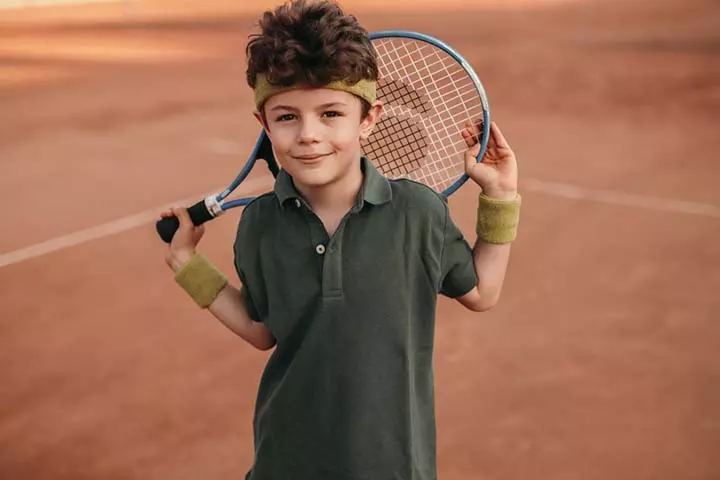
Some studies show that children, whose diet consists of olive oil, are less likely to develop obesity (4). You can thank the healthy fats for this benefit!
These are a few things you can give your child if you start using olive oil. You can now buy olive oil specially made for kids. Some brands have launched child-friendly olive oil, which has a fruity flavor, without compromising on the nutrition. If you have a fussy eater, this delicious flavor may help you out. Olive oil is also known to treat cases of baby constipation and may thus be beneficial for good digestive health.
You can start using olive oil to cook for your baby as soon as she is six months old. But of course, you should consult your doctor first.
 Point to consider
Point to considerHow To Use Olive Oil For Kids
If you have decided to add olive oil to your child’s diet, let us explain how you can use it:
Olive Oil For Babies
If your doctor has given you the green light, you can add olive oil to your baby’s diet as soon as they are ready for solids, usually around six months. You can add a spoonful of this oil to your baby food. It’s a great way to introduce new flavors to your baby.
Olive Oil For Toddlers And Older Children
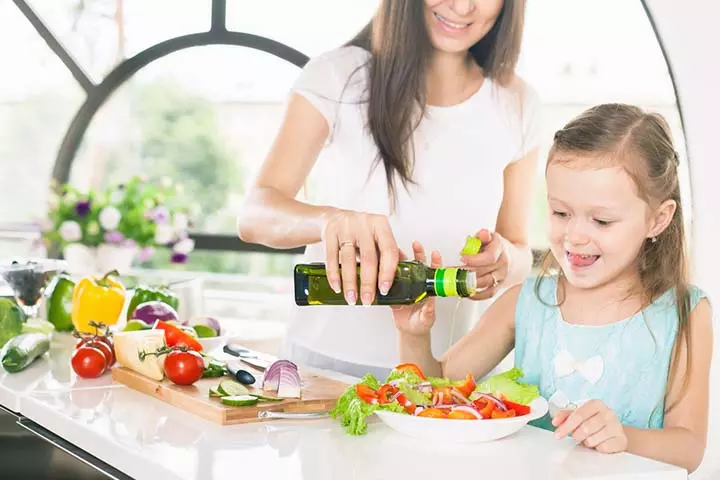
You can prepare your child’s daily food in olive oil. Kids this age usually love fried food. If you use olive oil, you’ll be making fried food ‘healthy’! You can even use it for baking or sautéing. If you have a foodie for a child, you can use extra virgin olive oil as salad dressing and serve her a bowl full of health.
David Steinman, a single parent and author, shares how he combines broccoli and cauliflower with olive oil to make a kid-friendly dish. He says, “I bought a bag of organic broccoli and cauliflower florets and put them into old no-PFAS pans. I used liberal amounts of organic olive oil with a PFAS-free silicone basting brush and plenty of freshly cut garden spices: trailing rosemary, potted oregano, wild sage, patio parsley, and garlic. I roasted them for about 25 minutes at 375 degrees F. They got a little brown and were the best veggie candy. Kids gobbled them (i).”
Frequently Asked Questions
1. Is extra virgin olive oil healthy for children?
Olive oil contains essential nutrients that are helpful for a child’s overall well-being (7). In addition, extra virgin olive oil (EVOO) preserves more nutrients than other variants of olive oil (8). Hence, EVOO is healthy for children.
2. Are olives good for children?
Olives contain unsaturated fats, which are good for heart health when used instead of trans-fats or saturated fats (9). Therefore, you can offer olives to your child in moderation.
3. Can olive oil be used as a remedy for ear infections in children?
No, an ear infection or pain may also occur from a burst eardrum, and using olive drops in such cases may cause more damage (10). Thus it is not advisable to use olive for ear infections without consulting a doctor and knowing the underlying cause.
4 How should I choose and store olive oil?
Choose high-quality olive oil, especially extra virgin olive oil, as it retains more nutrients and antioxidants. Also, look for oils in dark glass bottles to protect from light degradation, and check for a recent harvest date. Store the oil in a cool, dark place and use it within its “best by” date to ensure freshness and nutritional quality.
Including olive oil for kids can help you make their foods healthier and tastier, making it a must-item in your kitchen pantry. Even though it is a little on the expensive side, olive oil is packed with nutrients and antioxidants that help in a child’s brain development, prevention of various diseases, and maintenance of healthy skin, along with other significant benefits. So go ahead and include it in your child’s diet for their healthy growth and development.
Infographic: How To Use Olive Oil For Babies And Children
Olive oil is a concentrated source of vitamins E and K. Moreover, it has a higher proportion of unsaturated or good fats than saturated or bad fats. Therefore, olive oil has many applications in skincare, particularly for children and babies. Here are some ways you can use this oil for babies and children.

Illustration: Momjunction Design Team
Illustration: Amazing Benefits Of Olive Oil For Kids

Image: Stable Diffusion/MomJunction Design Team
Personal Experience: Source
MomJunction articles include first-hand experiences to provide you with better insights through real-life narratives. Here are the sources of personal accounts referenced in this article.
i. How I hooked my kids on broccoli and cauliflower.https://medium.com/@davidwilliamsteinman/how-i-hooked-my-kids-on-broccoli-and-cauliflower-ccd69f56c3ac
References
- Monika Dvorákov et al.; (2006); The effect of polyphenolic extract from pine bark Pycnogenol on the level of glutathione in children suffering from attention deficit hyperactivity disorder (ADHD).
https://pubmed.ncbi.nlm.nih.gov/16984739/ - Vèronique Habauzit and Christine Morand; (2012); Evidence for a protective effect of polyphenols-containing foods on cardiovascular health: an update for clinicians.
https://www.ncbi.nlm.nih.gov/pmc/articles/PMC3513903/ - The Possible Role of Squalene as a Protective Agent in Sebum.
http://cancerres.aacrjournals.org/content/16/6/500.full.pdf - J J Haro-Mora et al.; (2011); Children whose diet contained olive oil had a lower likelihood of increasing their body mass index Z-score over 1 year.
https://pubmed.ncbi.nlm.nih.gov/21715417/ - Mediterranean Diet Pyramid.
https://www.internationaloliveoil.org/olive-world/olive-oil-health/ - Olive Oil 101.
https://news.hr.ufl.edu/wp-content/uploads/sites/11/2024/05/OliveOil101_1.pdf - Every Baby Matters.
https://democracy.luton.gov.uk/cmis5public/Document.ashx?czJKcaeAi5tUFL1DTL2UE4zNRBcoShgo=GROpAfVCDzwOXY6BXtobOmQUIjy%2FWigvhjWzWF6NdRa6IgLtjAMxtg%3D%3D&rUzwRPf%2BZ3zd4E7Ikn8Lyw%3D%3D=pwRE6AGJFLDNlh225F5QMaQWCtPHwdhUfCZ%2FLUQzgA2uL5jNRG4jdQ%3D%3D&mCTIbCubSFfXsDGW9IXnlg%3D%3D=hFflUdN3100%3D&kCx1AnS9%2FpWZQ40DXFvdEw%3D%3D=hFflUdN3100%3D&uJovDxwdjMPoYv%2BAJvYtyA%3D%3D=ctNJFf55vVA%3D&FgPlIEJYlotS%2BYGoBi5olA%3D%3D=NHdURQburHA%3D&d9Qjj0ag1Pd993jsyOJqFvmyB7X0CSQK=ctNJFf55vVA%3D&WGewmoAfeNR9xqBux0r1Q8Za60lavYmz=ctNJFf55vVA%3D&WGewmoAfeNQ16B2MHuCpMRKZMwaG1PaO=ctNJFf55vVA%3D - Is extra-virgin olive oil extra healthy?;
https://www.health.harvard.edu/nutrition/is-extra-virgin-olive-oil-extra-healthy - Learning About Fats;
https://kidshealth.org/en/kids/fat.html - Earache.
https://www.healthdirect.gov.au/earache
Community Experiences
Join the conversation and become a part of our nurturing community! Share your stories, experiences, and insights to connect with fellow parents.
Read full bio of Dr. Dur Afshar Agha
Read full bio of Ria Saha
Read full bio of Swati Patwal
Read full bio of Dr. Joyani Das











